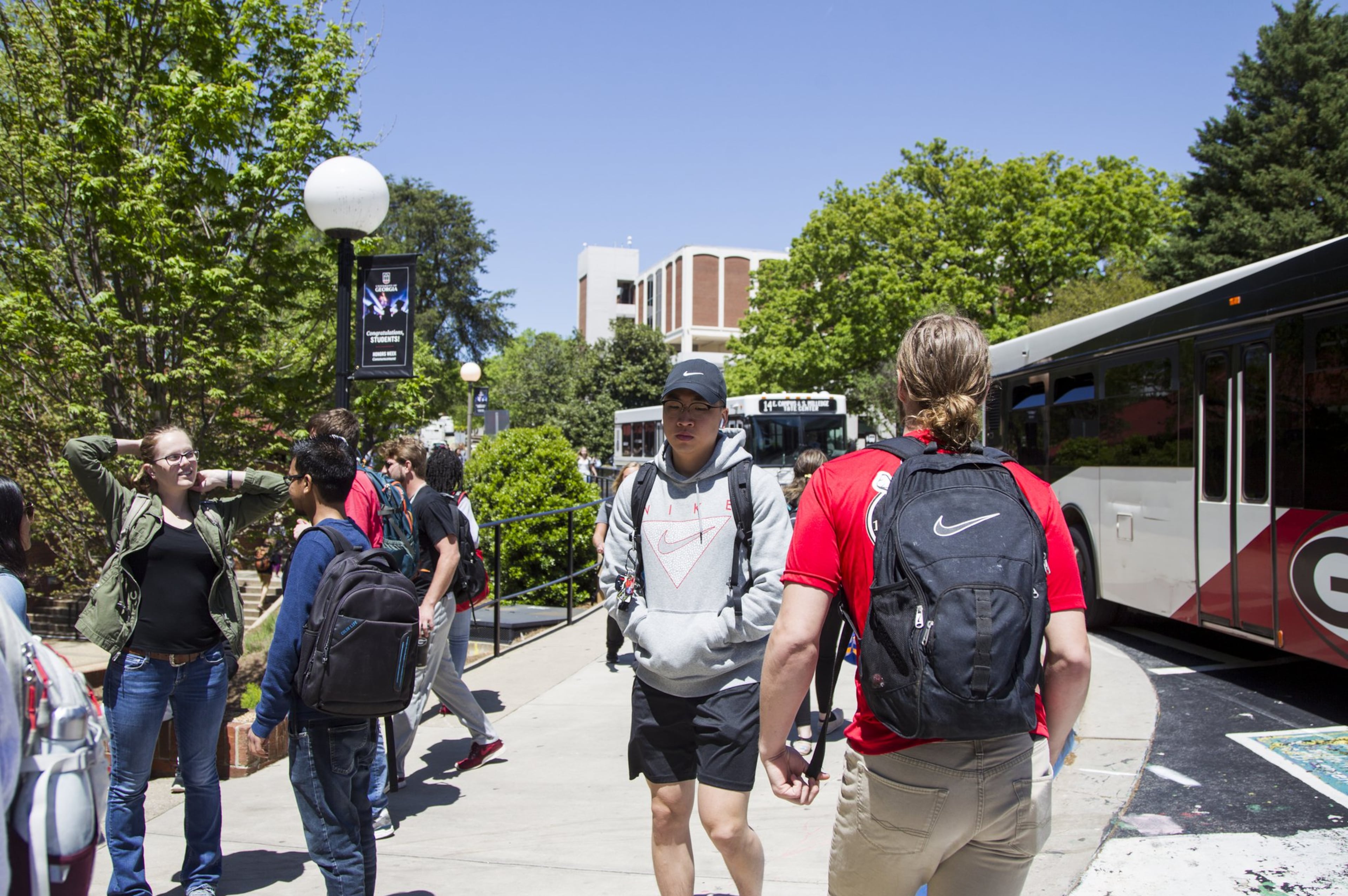Georgia teens explain how Trump’s policies changed their college plans

Marlow Darling, a graduating senior at The Paideia School, was touring a couple of colleges with his family recently when his mom turned to him with a thought.
“You have to seriously consider going to Ireland,” she told her son. Marlow is transgender, and she was worried about his safety.
The 17-year-old got into Trinity College in Dublin, but didn’t want to go — not really. But during Donald Trump‘s second term as president of the U.S., Marlow and his family felt like they didn’t have a choice, considering his administration’s executive orders against transgender and nonbinary Americans.
“It’s definitely going to be safer for a transgender teenager,” he said of attending school in Ireland. “My education doesn’t matter in terms of my safety … (but) it didn’t ever seem like a reality or the school that I would pick until Trump won.”

It’s an example of the decisions that many Georgia teenagers are having to make as the federal government squares off against institutions of higher learning in unforeseen ways. Since Trump‘s January inauguration, the administration has frozen billions of dollars in federal funding to universities across the country, including in Georgia; canceled the visas of thousands of international students, then saw them restored by the courts; said it would target student protesters for deportation; and told schools to end diversity, equity and inclusion efforts.
The Atlanta Journal-Constitution spoke with seven graduating Georgia high school seniors about how the mounting tension and unprecedented federal pressure on colleges and universities has influenced their decisions about where to go to college. They’re worried about cuts to research funding, the dismantling of DEI programs, threats to their First Amendment rights and tariffs.
“I never had imagined this would be something I’d have to think about,” said Aissa Diop, who’s graduating from Banneker High in College Park. “Up until January it hadn’t even come across my mind.”

The Ivy question
Aissa, 18, doesn’t remember too much about Trump‘s first term in office, when she was in middle school. But she remembers coming home one day and her father not being there. He had been deported to Senegal, where her parents are from.
“I don’t really remember that being a happy period of time for me,” she said.
Now, the news of international students losing their visas and of universities cracking down on protesters under threats from the federal government weighs on her. A recipient of the prestigious Gates Scholarship, Aissa was considering one of the Ivy League schools, which have been a focus of Trump‘s ire. In the end she decided to attend New York University.
“Would I want to go to a school who would basically sell my rights in order to get funding?” she said. “My immediate answer to that question was no, because it could be at any moment where it’s no longer international students, but it could be Black students, or students born into immigrant families or low-income students.”

When the Trump administration threatened in March to withhold $400 million in federal funding from Columbia University for alleged inaction to antisemitism on campus, the Ivy League school complied with the administration’s demands in a move some called “bending the knee.”
Facing similar threats to several billion dollars in federal funding, Harvard University filed a lawsuit accusing the administration of violating the First Amendment. This week, Education Secretary Linda McMahon said in a letter to Harvard that the university would not be eligible for new federal research grants moving forward.
Danielle Kangnigan, the valedictorian at Banneker High School in College Park, had similar concerns about attending an Ivy League school.
“I was really side-eyeing most of the Ivy Leagues. I really knew there was no point to apply there ... It’s almost like I go there and I have to be quiet and shut up.” Danielle is also going to New York University to study physics and mathematics.

Columbia’s response to the federal government’s demands was on Amir Mason’s mind. The 16-year-old is graduating from the Westminster Schools, and Columbia University is the only school he really considered. He applied early and was accepted right away. He wants to major in urban studies and get involved with the Black community there.
“I would have much rather it took the approach of Harvard, taking the stand for their students,” he said. But he gets it. “Even though Columbia is an Ivy, not everyone has the endowment that Harvard does.”
But Amir’s convinced he can make it work.
“I have that feeling that whatever I face, I’ll be able to overcome it,” he said. “Columbia at the end of the day will still be Columbia.”

Money matters
Though the Trump administration is giving high school seniors a new set of things to consider, they have plenty in common with the classes that came before them. How they’re going to pay for college is a chief concern.
Daniella Kangnigan, Danielle’s twin and Banneker High’s salutatorian, is still figuring out how to pay for school. It’s been a difficult equation so far. Rules for student loans are shifting, and the botched rollout of changes to the Federal Application For Student Aid, or FAFSA, hit when this graduating class was applying.
“I found myself asking myself, should I pursue fashion, should I pursue something creative, or should I go full force with something that I know will give me that financial stability?” said Daniella, who will be studying fashion at Parsons School of Design in New York City, where the tuition this fall will be about $30,000 per semester. Though the twins have a newfound understanding of students who opt not to go to college after high school, the answer was clear to Daniella: “I’m not going to sacrifice my happiness for an oppressive regime.”

Even for students who don’t have to worry about how to pay for college, there’s a new factor Trump introduced. Threats to federal funding has been the administration’s go-to weapon to get colleges and universities to adhere to its demands. In 2023, universities received about $60 billion in federal funding. What about funding for the academic programs seniors are planning to go through in college or research they hope to do?
Evelyn Zhang, 17-year-old valedictorian at Johns Creek High School, chose Duke University in part because of its reputation as a research institution. She’s majoring in biology and plans to go into the medical field, so research will be a “critical” aspect of her college experience.
“Research across the country is being cut drastically, so that does worry me,” she said. “Minimizing that pathway ... is kind of risky, because you’re basically kind of putting a cap on the amount of innovation and discovery that can happen.”
She’s trying not to worry about possible impacts to Duke, since it’s not an Ivy League. The North Carolina school, though, recently announced it has frozen hiring as it braces for federal funding cuts.
At 18, Danielle, who wants to be an astrophysicist and get a Ph.D. someday, is already worried about an eventual thesis. “How am I going to get funds to do the projects I want?”

‘The next chapter’
Isabella Frazier, who’s graduating from the Savannah Chatham E-Learning Academy and plans to major in communication at nearby Georgia Southern University, wasn’t old enough to vote in the November election. She tries to focus on things she can control, like applying for scholarships.
“Anything I could do happened in November,” said Isabella, 18. “Other than a random sense of impending doom, pretty much nothing has changed that much. I’m still just as motivated and ready to move on to this next chapter as I was prior to November.”

Aissa called what’s happening between Trump and colleges “worrying” and “heartbreaking.” She feels like the country is going backward, not forward. But she’s still hopeful.
“Education is something that somebody can never take away from you,” she said. “And I think that with just picking up a book, you can start somewhere to change the future for the better.”
Even though it didn’t feel like his decision, Marlow is trying to think positively when it comes to his move to Ireland.
“I am looking forward to having this big, new experience,” he said. “A lot of the time I have to like, remind myself that it’s exciting as well as frustrating and upsetting that I have to go somewhere else to feel safe.”



